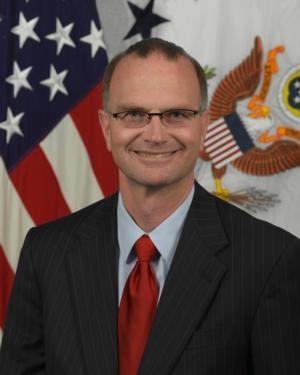Fri, Jun 08, 2012
U.S. Has 'Fine-Tuned' Methods To Promote Responsible Use Of Space
The U.S. has fine-tuned its methods to promote responsible use of space and strengthen international partnerships, Ambassador Gregory L. Schulte, the deputy assistant secretary of defense for space policy, said during the 2012 Women in Aerospace Conference June 1. In his keynote address at the conference, Schulte outlined the plan to protect U.S. advantages and sustainability in space as directed by the National Security Strategy for Space issued by Defense Secretary Leon E. Panetta and national intelligence officials.

"Space is no longer a pristine environment," Schulte (pictured) said. "We have to think differently about how we cooperate with others in space."
Schulte explained that burgeoning interest in space by a number of nations is both an asset and a liability. "Allied capabilities can augment ours, add resilience and increase our ability to operate in a contested space environment when adversaries may be trying to take away our space capabilities," he said. "As there are more and more actors in space, it becomes more important that we bring a certain amount of order to that domain, that we encourage countries to act responsibly." As such, Schulte said, Secretary of State Hillary Rodham Clinton and U.S. Strategic Command, based at Offutt Air Force Base, Neb., have weighed in this year to take deliberate steps in negotiating space situational awareness agreements with countries across the globe.
The discussions have united the "European Union and other space-faring countries to develop an international voluntary code of conduct meant to encourage countries to act responsibly and call out those who act irresponsibly," Schulte said.
The norms, Schulte asserts, aim to help U.S. and coalition countries share information on an emergency basis, encourage best practices to buffer the uptick of mishaps and control the creation of additional debris in space. "(STRATCOM) tracks over 20,000 pieces of debris -- and that's just what they can see," Schulte said. "NASA estimates there are probably hundreds of thousands of pieces of debris up there."
Harnessing international partnerships also includes a plan to expand the Joint Space Operations Center at Vandenberg Air Force Base, Calif., into a coalition asset by integrating Canada's first operational military space-based telescope system, Sapphire. A larger constellation of satellites supplied by international partner nations provides greater coverage and bandwidth, Schulte said, and also creates an international space alliance that can act as a deterrent to threats against the U.S. and its allies.
More News
Terminal Radar Service Area Airspace surrounding designated airports wherein ATC provides radar vectoring, sequencing, and separation on a full-time basis for all IFR and participa>[...]
Aero Linx: Utah Back Country Pilots Association (UBCP) Through the sharing experiences, the UBCP has built upon a foundation of safe operating practices in some of the most challen>[...]
From 2010 (YouTube Edition): Imagine... Be The Change... Inspire FROM 2010: One of the more unusual phone calls I have ever received occurred a few years ago... from Anousheh Ansar>[...]
(Pilot) Felt A Shudder And Heard The Engine Sounding Differently, Followed By The Engine Chip Detector Light On April 14, 2025, about 1800 Pacific daylight time, a Bell 206B, N1667>[...]
Also: AMA Names Tyler Dobbs, More Falcon 9 Ops, Firefly Launch Unsuccessful, Autonomous F-16s The Air Force has begun ground testing a future uncrewed jet design in a milestone tow>[...]
 ANN's Daily Aero-Term (05.07.25): Terminal Radar Service Area
ANN's Daily Aero-Term (05.07.25): Terminal Radar Service Area ANN's Daily Aero-Linx (05.07.25)
ANN's Daily Aero-Linx (05.07.25) Classic Aero-TV: Anousheh Ansari -- The Woman Behind The Prize
Classic Aero-TV: Anousheh Ansari -- The Woman Behind The Prize NTSB Prelim: Bell 206B
NTSB Prelim: Bell 206B Airborne-NextGen 05.06.25: AF Uncrewed Fighters, Drones v Planes, Joby Crew Test
Airborne-NextGen 05.06.25: AF Uncrewed Fighters, Drones v Planes, Joby Crew Test



